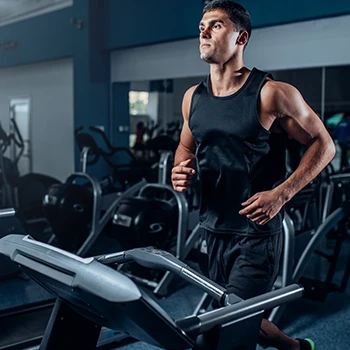As a fitness coach, I often get this question from my clients and friends: should you run before or after a workout?
For months, my clients and I have integrated running before and after every exercise routine. The results varied, and I had to devote my time to research to get to know why.
I have summarized all the information obtained in this article.
Let’s get into it.
Quick Summary
- Your fitness goals influence whether you will run before or after a workout.
- Running improves your aerobic agility, helps burn more calories, and improves your cardiovascular health.
- Studies published by the journal Applied Physiology, Nutrition, and Metabolism demonstrated that people who did strength training before running had worse running impairment than those who ran first.
- In my view, the decision to run before or after weightlifting should align with individual fitness goals, but a well-rounded approach often leads to the best overall health benefits.
What Does Running Do to Your Body?

Running improves your cardiovascular health and aerobic agility, burns more calories, improves sleep quality, and enhances muscular endurance and muscle strength.
Additionally, running before a workout might boost your mood and mental readiness for strength training, while running afterward could provide a calming, stress-relieving effect.
Many endurance athletes today know that to train efficiently, they need to do more than just run.
Cross-training is currently widely regarded as the most effective universal technique for enhancing athletic prowess, mobility, and general emotional well-being.
Cross-training involves:
- Varying your exercises.
- Targeting your cardiovascular system.
- Working different muscle areas, lower and upper body.
- Using both slow and quick twitch muscles.
The answer to whether you should run before or after a workout depends on several factors, including:
- What are your general fitness objectives?
- What do you hope to gain?
- How would you like to improve?
Running or other types of cardio may be a difficult exercise on their own, but most runners understand that a strength workout routine is a crucial supplement to running miles.
Know Your Goal

Your fitness goals dictate your exercise sequence. Want to boost your running mileage and prevent injuries? Pair running with weightlifting.
If you're a runner focused on health or aiming to lose weight through cardio and strength training, your main fitness goal determines the first exercise.
Runners should run before gym sessions. Those focusing on muscle building or strength should lift weights before cardio.
Prioritizing your primary workout ensures optimal performance, as my experience with clients demonstrates.
The second exercise, scheduled after the primary one, supports the first, mitigating the fatigue known as 'interference, often felt during subsequent sessions.
How to Train for Your Goal?

Setting specific goals before embarking on a fitness regime is critical to guaranteeing you work out most efficiently.
If You Want to Lose Weight
For weight loss, it's less about whether you run or lift weights first; strength training is key for fat burning.
While cardio burns calories, resistance training or high-intensity interval training (HIIT) three to four times a week is more effective.
This approach builds lean muscle, which increases fat burning over time and boosts aerobic metabolism.
"Ultimately, aerobic exercise uses more energy and expends more calories because you're moving regularly, but endurance training may need you to spend two-thirds of your time resting, so adding some cardio can enhance your overall calorie burn."
- Eric Sternlicht, Ph.D.
Research from the International Journal of Exercise Science reveals that intense resistance training with short rest periods generates significant excess post-exercise oxygen consumption (EPOC), meaning more calories burned post-workout [1].
This effect is amplified with heavier weights and shorter breaks, leveraging anaerobic energy systems and increasing post-exercise oxygen demand.
In my training experience, clients who combine these methods see notable improvements in fat loss.
If You Want to Build Muscle

To build and maintain muscle mass, focus on hypertrophy weight training in your gym routine.
Consistently lifting heavier weights with 8 to 12 reps leads to muscle strain and, as the Journal of Immunology Research indicates, microtrauma and glycogen depletion [2].
This process, essential for muscle protein synthesis, strengthens and enlarges muscles, enhancing their resilience to similar future workouts.
Running before weightlifting can drain the energy needed for these intense sessions, reducing muscle contraction effectiveness, particularly in the lower body, and potentially impairing form due to fatigue. This is supported by Public Library of Science research [3].
In my experience as a fitness trainer, I recommend clients aiming for muscle growth conclude their sessions with light cardio, like a 10-minute jog, to promote blood flow without compromising muscle-building efforts.
Related: How to Build Muscle Without Weights?
If You Want to Increase Endurance
The same concept applies here, which says you must emphasize weightlifting if you want to improve strength and aerobic capacity.
A hard workout day prior to running performance may tire the muscles, leading you to compromise good form when performing cardio and increasing your chance of injury.
If you're preparing for a run, using weights before cardio may reduce your stamina.
As per a study in the journal Applied Physiology, Nutrition, and Metabolism, people who did strength training before running had worse running impairment than those who ran first [4].
My clients and I have compiled a list of the best pre-workouts for running, and their contribution to our workouts has been incredible.
FAQs
Is It Good to Run and Workout on the Same Day?
You can run and work out on the same day with at least nine hours of recovery in between.
Will I Lose Muscles If I Run in The Morning?
You will lose muscle if you run in the morning since your cortisol levels are high.
Should I Run After a Leg Day?
No. You should not run after a leg day. You should rather have a 48-hour recovery after it.
Does Running After a Workout Burn More Fat?
Yes. Running after a workout burns more fat during the first fifteen minutes of that workout.
References:
- https://www.ncbi.nlm.nih.gov/pmc/articles/PMC8439678/
- https://www.ncbi.nlm.nih.gov/pmc/articles/PMC6038656/
- https://journals.plos.org/ploscompbiol/article?id=10.1371/journal.pcbi.1000960
- https://www.researchgate.net/publication/237001158
About The Author
You May Also Like






